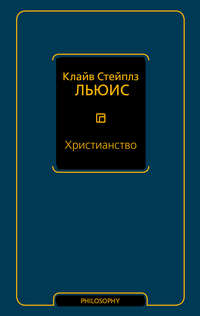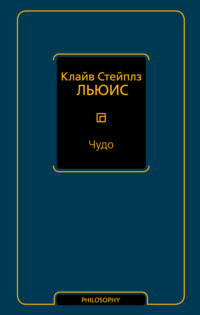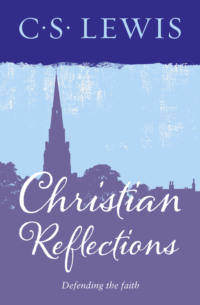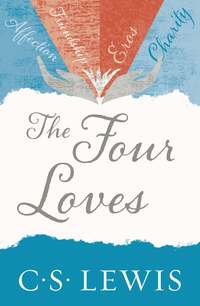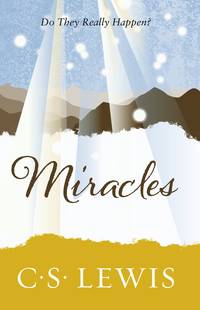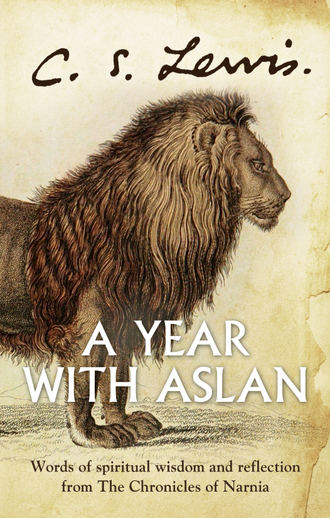
A Year With Aslan: Words of Wisdom and Reflection from the Chronicles of Narnia
“Excuse me, Tarkheena,” said Bree (with just the slightest backward tilt of his ears), “but that’s Calormene talk. We’re free Narnians, Hwin and I, and I suppose, if you’re running away to Narnia, you want to be one too. In that case Hwin isn’t your horse any longer. One might just as well say you’re her human.”
The girl opened her mouth to speak and then stopped. Obviously she had not quite seen it in that light before.
– The Horse and His Boy
How do you think Aravis feels to hear the radical Narnian view of horse ownership? Have you ever felt possessive of another person as she felt about her horse, Hwin? If so, what can you do to view him or her more as a free person and less as yours?
FEBRUARY 19
We Simply Must Try
[MR TUMNUS’S] door had been wrenched off its hinges and broken to bits. Inside, the cave was dark and cold and had the damp feel and smell of a place that had not been lived in for several days. Snow had drifted in from the doorway and was heaped on the floor, mixed with something black, which turned out to be the charred sticks and ashes from the fire. Someone had apparently flung it about the room and then stamped it out. The crockery lay smashed on the floor and the picture of the Faun’s father had been slashed into shreds with a knife.
“This is a pretty good washout,” said Edmund; “not much good coming here.”
“What is this?” said Peter, stooping down. He had just noticed a piece of paper which had been nailed through the carpet to the floor.
“Is there anything written on it?” asked Susan.
“Yes, I think there is,” answered Peter, “but I can’t read it in this light. Let’s get out into the open air.”
They all went out in the daylight and crowded round Peter as he read out the following words:
The former occupant of these premises, the Faun Tumnus, is under arrest and awaiting his trial on a charge of High Treason against her Imperial Majesty Jadis, Queen of Narnia, Chatelaine of Cair Paravel, Empress of the Lone Islands, etc., also of comforting her said Majesty’s enemies, harboring spies and fraternizing with Humans.
signed MAUGRIM, Captain of the Secret Police,
LONG LIVE THE QUEEN!
The children stared at each other.
“I don’t know that I’m going to like this place after all,” said Susan.
“Who is this Queen, Lu?” said Peter. “Do you know anything about her?”
“She isn’t a real queen at all,” answered Lucy; “she’s a horrible witch, the White Witch. Everyone – all the wood people – hate her. She has made an enchantment over the whole country so that it is always winter here and never Christmas.”
“I – I wonder if there’s any point in going on,” said Susan. “I mean, it doesn’t seem particularly safe here and it looks as if it won’t be much fun either. And it’s getting colder every minute, and we’ve brought nothing to eat. What about just going home?”
“Oh, but we can’t, we can’t,” said Lucy suddenly; “don’t you see? We can’t just go home, not after this. It is all on my account that the poor Faun has got into this trouble. He hid me from the Witch and showed me the way back. That’s what it means by comforting the Queen’s enemies and fraternizing with Humans. We simply must try to rescue him.”
– The Lion, the Witch and the Wardrobe
Why does Lucy feel that they must try to rescue Mr Tumnus? What would you do in her situation? How should we balance loyalty with a concern for our own safety?
FEBRUARY 20
Eustace Clarence Scrubb
THERE WAS A BOY CALLED Eustace Clarence Scrubb, and he almost deserved it. His parents called him Eustace Clarence and masters called him Scrubb. I can’t tell you how his friends spoke to him, for he had none. He didn’t call his father and mother “Father” and “Mother”, but Harold and Alberta. They were very up-to-date and advanced people. They were vegetarians, non-smokers and teetotallers and wore a special kind of underclothes. In their house there was very little furniture and very few clothes on beds and the windows were always open.
Eustace Clarence liked animals, especially beetles, if they were dead and pinned on a card. He liked books if they were books of information and had pictures of grain elevators or of fat foreign children doing exercises in model schools.
Eustace Clarence disliked his cousins, the four Pevensies, Peter, Susan, Edmund and Lucy. But he was quite glad when he heard that Edmund and Lucy were coming to stay. For deep down inside him he liked bossing and bullying; and, though he was a puny little person who couldn’t have stood up even to Lucy, let alone Edmund, in a fight, he knew that there are dozens of ways to give people a bad time if you are in your own home and they are only visitors.
– The Voyage of the Dawn Treader
Why would Eustace Clarence Scrubb almost deserve his name? Why might someone like Eustace want to give Edmund and Lucy a bad time? Have you come across people in your life who fit Eustace’s description?
FEBRUARY 21
Edmund Enters Narnia
[EDMUND] CAME INTO THE ROOM just in time to see Lucy vanishing into the wardrobe. He at once decided to get into it himself – not because he thought it a particularly good place to hide but because he wanted to go on teasing her about her imaginary country. He opened the door. There were the coats hanging up as usual, and a smell of moth-balls, and darkness and silence, and no sign of Lucy. “She thinks I’m Susan come to catch her,” said Edmund to himself, “and so she’s keeping very quiet in at the back.” He jumped in and shut the door, forgetting what a very foolish thing this is to do. Then he began feeling about for Lucy in the dark. He had expected to find her in a few seconds and was very surprised when he did not. He decided to open the door again and let in some light. But he could not find the door either. He didn’t like this at all and began groping wildly in every direction; he even shouted out, “Lucy! Lu! Where are you? I know you’re here.”
There was no answer and Edmund noticed that his own voice had a curious sound – not the sound you expect in a cupboard, but a kind of open-air sound. He also noticed that he was unexpectedly cold; and then he saw a light.
“Thank goodness,” said Edmund, “the door must have swung open of its own accord.” He forgot all about Lucy and went towards the light, which he thought was the open door of the wardrobe. But instead of finding himself stepping out into the spare room he found himself stepping out from the shadow of some thick dark fir trees into an open place in the middle of a wood.
There was crisp, dry snow under his feet and more snow lying on the branches of the trees. Overhead there was a pale blue sky, the sort of sky one sees on a fine winter day in the morning. Straight ahead of him he saw between the tree-trunks the sun, just rising, very red and clear. Everything was perfectly still, as if he were the only living creature in that country. There was not even a robin or a squirrel among the trees, and the wood stretched as far as he could see in every direction. He shivered.
He now remembered that he had been looking for Lucy; and also how unpleasant he had been to her about her “imaginary country” which now turned out not to have been imaginary at all. He thought that she must be somewhere quite close and so he shouted, “Lucy! Lucy! I’m here too – Edmund.”
There was no answer.
“She’s angry about all the things I’ve been saying lately,” thought Edmund. And though he did not like to admit that he had been wrong, he also did not much like being alone in this strange, cold, quiet place; so he shouted again.
“I say, Lu! I’m sorry I didn’t believe you. I see now you were right all along. Do come out. Make it Pax.”
Still there was no answer.
– The Lion, the Witch and the Wardrobe
Do you think Edmund’s apology is sincere? When have you had trouble admitting you were wrong?
FEBRUARY 22
Talking Beasts
“CREATURES, I GIVE YOU YOURSELVES,” said the strong, happy voice of Aslan. “I give to you forever this land of Narnia. I give you the woods, the fruits, the rivers. I give you the stars and I give you myself. The Dumb Beasts whom I have not chosen are yours also. Treat them gently and cherish them but do not go back to their ways lest you cease to be Talking Beasts. For out of them you were taken and into them you can return. Do not so.”
– The Magician’s Nephew
What would it mean for the Talking Beasts to go back to their former ways? How could they prevent that from happening?
FEBRUARY 23
How Can I Help It?
SHASTA HAD SO ENJOYED HIS DINNER and all the things Tumnus had been telling him that when he was left alone his thoughts took a different turn. He only hoped now that the real Prince Corin would not turn up until it was too late and that he would be taken away to Narnia by ship. I am afraid he did not think at all of what might happen to the real Corin when he was left behind in Tashbaan. He was a little worried about Aravis and Bree waiting for him at the Tombs. But then he said to himself, “Well, how can I help it?” and, “Anyway, that Aravis thinks she’s too good to go about with me, so she can jolly well go alone,” and at the same time he couldn’t help feeling that it would be much nicer going to Narnia by sea than toiling across the desert.
– The Horse and His Boy
What are the excuses Shasta tells himself for not worrying about what may happen to the others? When have you left others at risk by putting your own interests first?
FEBRUARY 24
Happy Is the Horse
“ASLAN,” SAID BREE in a shaken voice, “I’m afraid I must be rather a fool.”
“Happy is the Horse who knows that while he is still young. Or the Human either.”
– The Horse and His Boy
How could knowing we are fools make us happy?
FEBRUARY 25
Deathwater Island
“GET BACK!” [shouted Edmund.] “Back from the water. All of you. At once!!”
They all did and stared at him.
“Look,” said Edmund, “look at the toes of my boots.”
“They look a bit yellow,” began Eustace.
“They’re gold, solid gold,” interrupted Edmund. “Look at them. Feel them. The leather’s pulled away from it already. And they’re as heavy as lead.”
“By Aslan!” said Caspian. “You don’t mean to say—?”
“Yes, I do,” said Edmund. “That water turns things into gold. It turned the spear into gold, that’s why it got so heavy. And it was just lapping against my feet (it’s a good thing I wasn’t barefoot) and it turned the toe-caps into gold. . . . And what a narrow shave we’ve had.”
“Narrow indeed,” said Reepicheep. “Anyone’s finger, anyone’s foot, anyone’s whisker, or anyone’s tail, might have slipped into the water at any moment.”
“All the same,” said Caspian, “we may as well test it.” He stooped down and wrenched up a spray of heather. Then, very cautiously, he knelt beside the pool and dipped it in. It was heather that he dipped; what he drew out was a perfect model of heather made of the purest gold, heavy and soft as lead.
“The King who owned this island,” said Caspian slowly, and his face flushed as he spoke, “would soon be the richest of all Kings of the world. I claim this land forever as a Narnian possession. It shall be called Goldwater Island. And I bind all of you to secrecy. No one must know of this. Not even Drinian – on pain of death, do you hear?”
“Who are you talking to?” said Edmund. “I’m no subject of yours. If anything it’s the other way round. I am one of the four ancient sovereigns of Narnia and you are under allegiance to the High King my brother.”
“So it has come to that, King Edmund, has it?” said Caspian, laying his hand on his sword-hilt.
“Oh, stop it, both of you,” said Lucy. “That’s the worst of doing anything with boys. You’re all such swaggering, bullying idiots – oooh!—” Her voice died away into a gasp. And everyone else saw what she had seen.
Across the grey hillside above them – grey, for the heather was not yet in bloom – without noise, and without looking at them, and shining as if he were in bright sunlight though the sun had in fact gone in, passed with slow pace the hugest lion that human eyes have ever seen. . . . They knew it was Aslan.
And nobody ever saw how or where he went. They looked at one another like people waking from sleep.
“What were we talking about?” said Caspian. “Have I been making rather an ass of myself?”
“Sire,” said Reepicheep, “this is a place with a curse on it. Let us get back on board at once. And if I might have the honour of naming this island, I should call it Deathwater.”
– The Voyage of the Dawn Treader
What is the effect of the gold transformation on Caspian, Edmund, and Lucy in turn? When have you been transfixed by the potential for wealth and riches?
FEBRUARY 26
Do You Feel Yourself Sufficient?
THEN PETER, leading CASPIAN, forced his way through the crowd of animals.
“This is Caspian, Sir,” he said. And Caspian knelt and kissed the Lion’s paw.
“Welcome, Prince,” said Aslan. “Do you feel yourself sufficient to take up the Kingship of Narnia?”
“I – I don’t think I do, Sir,” said Caspian. “I’m only a kid.”
“Good,” said Aslan. “If you had felt yourself sufficient, it would have been a proof that you were not. Therefore, under us and under the High King, you shall be King of Narnia, Lord of Cair Paravel, and Emperor of the Lone Islands. You and your heirs while your race lasts.”
– Prince Caspian
Why would feeling sufficient be proof that Caspian was not? When have you had to step up to a task for which you did not feel sufficient?
FEBRUARY 27
Into the Pool
“LOOK! WHAT’S THAT?”
“What’s what?” said Puzzle.
“That yellow thing that’s just come down the waterfall. Look! There it is again, it’s floating. We must find out what it is.”
“Must we?” said Puzzle.
“Of course we must,” said Shift. “It may be something useful. Just hop into the Pool like a good fellow and fish it out. Then we can have a proper look at it.”
“Hop into the Pool?” said Puzzle, twitching his long ears.
“Well how are we to get it if you don’t?” said the Ape.
“But – but,” said Puzzle, “wouldn’t it be better if you went in? Because, you see, it’s you who wants to know what it is, and I don’t much. And you’ve got hands, you see. You’re as good as a Man or a Dwarf when it comes to catching hold of things. I’ve only got hoofs.”
“Really, Puzzle,” said Shift, “I didn’t think you’d ever say a thing like that. I didn’t think it of you, really.”
“Why, what have I said wrong?” said the Ass, speaking in rather a humble voice, for he saw that Shift was very deeply offended. “All I meant was—”
“Wanting me to go into the water,” said the Ape. “As if you didn’t know perfectly well what weak chests Apes always have and how easily they catch cold! Very well. I will go in. I’m feeling cold enough already in this cruel wind. But I’ll go in. I shall probably die. Then you’ll be sorry.” And Shift’s voice sounded as if he was just going to burst into tears.
“Please don’t, please don’t, please don’t,” said Puzzle, half braying, and half talking. “I never meant anything of the sort, Shift, really I didn’t. You know how stupid I am and how I can’t think of more than one thing at a time. I’d forgotten about your weak chest. Of course I’ll go in. You mustn’t think of doing it yourself. Promise me you won’t, Shift.”
– The Last Battle
Why does Puzzle give in? How do you attempt to get others to do something you know that you should do yourself?
FEBRUARY 28
We Can Only Ask Him
“WHEN WE CAME BACK FROM That Place, Someone said that the two Pevensie kids (that’s my two cousins) could never go there again. It was their third time, you see. I suppose they’ve had their share. But he never said I couldn’t. Surely he would have said so, unless he meant that I was to get back? And I can’t help wondering, can we – could we—?”
“Do you mean, do something to make it happen?” [Jill asked.]
Eustace nodded.
“You mean we might draw a circle on the ground – and write in queer letters in it – and stand inside it – and recite charms and spells?”
“Well,” said Eustace after he had thought hard for a bit. “I believe that was the sort of thing I was thinking of, though I never did it. But now that it comes to the point, I’ve an idea that all those circles and things are rather rot. I don’t think he’d like them. It would look as if we thought we could make him do things. But really, we can only ask him.”
“Who is this person you keep on talking about?”
“They call him Aslan in That Place,” said Eustace.
“What a curious name!”
“Not half so curious as himself,” said Eustace solemnly. “But let’s get on. It can’t do any harm, just asking.”
– The Silver Chair
Why wouldn’t drawing circles and reciting spells help Eustace and his friend Jill get to Narnia? How would that be different from asking? Do you sometimes find yourself trying to make something happen rather than asking for it outright?
MARCH
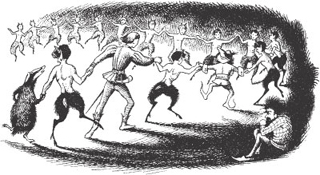
MARCH 1
The Ancient Treasure Chamber
FOR NOW ALL KNEW that it was indeed the ancient treasure chamber of Cair Paravel where they had once reigned as Kings and Queens of Narnia. There was a kind of path up the middle (as it might be in a greenhouse), and along each side at intervals stood rich suits of armour, like knights guarding the treasures. In between the suits of armour, and on each side of the path, were shelves covered with precious things – necklaces and arm rings and finger rings and golden bowls and dishes and long tusks of ivory, brooches and coronets and chains of gold, and heaps of unset stones lying piled anyhow as if they were marbles or potatoes – diamonds, rubies, carbuncles, emeralds, topazes, and amethysts. Under the shelves stood great chests of oak strengthened with iron bars and heavily padlocked. And it was bitterly cold, and so still that they could hear themselves breathing, and the treasures were so covered with dust that unless they had realized where they were and remembered most of the things, they would hardly have known they were treasures. There was something sad and a little frightening about the place, because it all seemed so forsaken and long ago. That was why nobody said anything for at least a minute.
Then, of course, they began walking about and picking things up to look at. It was like meeting very old friends. If you had been there you would have heard them saying things like, “Oh, look! Our coronation rings – do you remember first wearing this? – Why, this is the little brooch we all thought was lost – I say, isn’t that the armour you wore in the great tournament in the Lone Islands? – do you remember the dwarf making that for me? – do you remember drinking out of that horn? – do you remember, do you remember?”
– Prince Caspian
Why do Edmund, Lucy, Peter, and Susan react as they do to the treasure chamber? What makes something a treasure?
MARCH 2
He Has Betrayed Us All
“I SAY – WHERE’S EDMUND?”
There was a dreadful pause, and then everyone began asking “Who saw him last? How long has he been missing? Is he outside?” and then all rushed to the door and looked out. The snow was falling thickly and steadily, the green ice of the pool had vanished under a thick white blanket, and from where the little house stood in the centre of the dam you could hardly see either bank. Out they went, plunging well over their ankles into the soft new snow, and went round the house in every direction. “Edmund! Edmund!” they called till they were hoarse. But the silently falling snow seemed to muffle their voices and there was not even an echo in answer. . . .
“What on earth are we to do, Mr Beaver?” said Peter.
“Do?” said Mr Beaver, who was already putting on his snow-boots, “do? We must be off at once. We haven’t a moment to spare!”
“We’d better divide into four search parties,” said Peter, “and all go in different directions. . . .”
“Search parties, Son of Adam?” said Mr Beaver; “what for?”
“Why, to look for Edmund, of course!”
“There’s no point in looking for him,” said Mr Beaver.
“What do you mean?” said Susan. “He can’t be far away yet. And we’ve got to find him. . . .”
“The reason there’s no use looking,” said Mr Beaver, “is that we know already where he’s gone!” Everyone stared in amazement. “Don’t you understand?” said Mr Beaver. “He’s gone to her, to the White Witch. He has betrayed us all.”
“Oh, surely – oh, really!” said Susan; “he can’t have done that.”
“Can’t he?” said Mr Beaver, looking very hard at the three children, and everything they wanted to say died on their lips, for each felt suddenly quite certain inside that this was exactly what Edmund had done.
– The Lion, the Witch and the Wardrobe
How does Mr Beaver know where Edmund has gone? Why does it sometimes take an outsider to point out the failings of those we love?
MARCH 3
You Are Somebody?
“PLEASE, WHAT TASK, SIR?” said Jill.
“The task for which I called you and him here out of your own world.”
This puzzled Jill very much. “It’s mistaking me for someone else,” she thought. She didn’t dare to tell the Lion this, though she felt things would get into a dreadful muddle unless she did.
“Speak your thought, Human Child,” said the Lion.
“I was wondering – I mean – could there be some mistake? Because nobody called me and Scrubb, you know. It was we who asked to come here. Scrubb said we were to call to – to Somebody – it was a name I wouldn’t know – and perhaps the Somebody would let us in. And we did, and then we found the door open.”
“You would not have called to me unless I had been calling to you,” said the Lion.
“Then you are Somebody, Sir?” said Jill.
“I am.”
– The Silver Chair
Why is it hard for Jill to think that the Lion called her instead of the other way around? Do you tend to credit yourself with too much power or to accept too little responsibility for events in your life? What are some of the repercussions of each tendency?
MARCH 4
The Old Days
“I WISH – I WISH – I WISH I could have lived in the Old Days,” said Caspian. (He was only a very little boy at the time.)
Up till now King Miraz had been talking in the tiresome way that some grown-ups have, which makes it quite clear that they are not really interested in what you are saying, but now he suddenly gave Caspian a very sharp look.
“Eh? What’s that?” he said. “What old days do you mean?”
“Oh, don’t you know, Uncle?” said Caspian. “When everything was quite different. When all the animals could talk, and there were nice people who lived in the streams and the trees. Naiads and Dryads, they were called. And there were Dwarfs. And there were lovely little Fauns in all the woods. They had feet like goats. And—”



